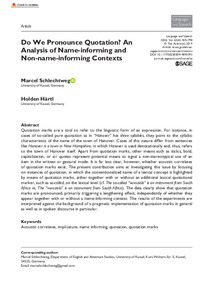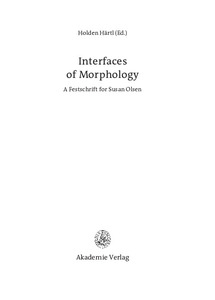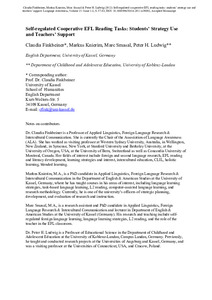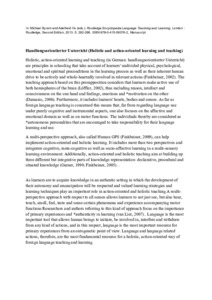Suche
Anzeige der Dokumente 1-6 von 6
Aufsatz
 Do We Pronounce Quotation? An Analysis of Name-informing and Non-name-informing Contexts
Do We Pronounce Quotation? An Analysis of Name-informing and Non-name-informing Contexts
(2019-12-23)
Quotation marks are a tool to refer to the linguistic form of an expression. For instance, in cases of so-called pure quotation as in “Hanover” has three syllables, they point to the syllabic characteristics of the name of the town of Hanover. Cases of this nature differ from sentences like Hanover is a town in New Hampshire, in which Hanover is used denotationally and, thus, refers to the town of Hanover itself. Apart from quotation marks, other means such as italics, bold, capitalization, or air quotes represent ...
Teil eines Buches
 Generic rescue: argument alternations the monotonicity condition
Generic rescue: argument alternations the monotonicity condition
(De Gruyter Mouton, 2013)
Generic interpretations as in “The tiger kills to survive” have often been observed to reconstitute the linguistic acceptability of certain verb argument structure modifications. But can the right context rescue everything? This paper investigates the impact a generic interpretation can have on three types of argument alternations: (i) the intransitive use of inherently telic verbs like “to kill”, (ii) the intransitive use of stative verbs like “to love”, and (iii) middle alternations like “it reads easily”. It will ...
Teil eines Buches
 Semantic non-transparency in the mental lexicon
Semantic non-transparency in the mental lexicon
(De Gruyter, 2015)
The notion of “Eigentlichkeit” (‘authenticity’), when approached from a perspective of language philosophy, is associated with the quality of linguistic entities of referring to things in the world in a truthful and a maximally transparent way, cf. Gardt (1995). Obviously, there are numerous expressions that do not seem to conduct themselves accordingly and display a rather “non-authentic”, i.e., non-transparent behavior instead, like indirect and ironic speech acts or idiomatic expressions like Cat got your tongue? ...
Teil eines Buches
 Arguments of non-heads
Arguments of non-heads
(Akademie Verlag, 2013)
The current paper investigates these cases from a lexicalist perspective. In particular, I will discuss whether realizations of arguments of non-heads of the above types are based on a regular grammatical process or not. I will argue that this is the case indeed with constructions of the type Designanalyse des Geschirrs, where the post-nominal element figures as argument of both the head as well as the non-head. In contrast, (prepositional) external argument realizations of the type in (1)—i.e. constructions in which ...
Aufsatz

 Self-regulated Cooperative EFL Reading Tasks: Students’ Strategy Use and Teachers’ Support
Self-regulated Cooperative EFL Reading Tasks: Students’ Strategy Use and Teachers’ Support
(2012-04-11)
The ADEQUA research project has gained empirical evidence on how the situationally adequate use of learning strategies can be facilitated during cooperative reading tasks in the EFL classroom. Two video studies were conducted with 9th grade EFL (English as a Foreign Language) learners in German schools: The first (laboratory) study investigated the students’ use of strategies while working in dyads and without teacher support on a given task. The second study, a field study, focused on teachers’ actions to support ...
Teil eines Buches

 Handlungsorientierter Unterricht (Holistic and action-oriented learning and teaching)
Handlungsorientierter Unterricht (Holistic and action-oriented learning and teaching)
(Routledge, 2013)
Holistic, action-oriented learning and teaching (in German: handlungsorientierter Unterricht) are principles in schooling that take account of learners' undivided physical, psychological, emotional and spiritual preconditions in the learning process as well as their inherent human drive to be actively and whole-heartedly involved in relevant actions (Finkbeiner, 2002). The teaching approach based on this presupposition considers that learners make active use of both hemispheres of the brain (Löffler, 2002), thus ...





